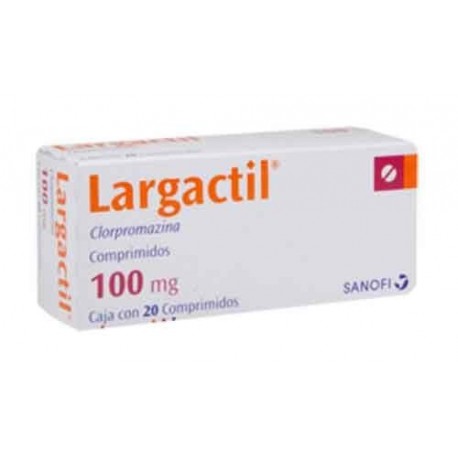 View larger
View larger Largactil (Chlorpromazine) 100 Mg 30 Tablets
LRGC2278
New product
BUY MORE PAY LESS
| Quantity | Discount | |
|---|---|---|
| 2 | 5% | |
| 3 | 10% | |
| 4 | 15% | |
| 5 | 20% |
Volume discounts
| Quantity | Discount | You Save |
|---|---|---|
| 2 | 5% | Up to $2.90 |
| 3 | 10% | Up to $8.70 |
| 4 | 15% | Up to $17.40 |
| 5 | 20% | Up to $29.00 |
More info
LARGACTİL® 100 mg Coated Tablet
FORMULA
In every tablet
Chlorpromazine [chloro-3- (dimethyl-amino-3-propyl) -10-phenothiazine (as hydrochloride)] .... 100 mg
PHARMACOLOGICAL PROPERTIES
Largactil is a neuroleptic drug with vagolytic, sympatholytic, sedative and anti-emetic properties.
preparation.
INDICATIONS
In Neuro-Psychiatry
Acute psychoses: Agitation states, hypomania and mania, delirium attacks,
confusional syndromes
Chronic psychoses: Schizophrenic conditions, especially paranoid schizophrenia, chronic delirium
situations
- Aggression situations in adults and children.
Excitation situations during senile dementia.
In General Medicine
- Anxiety and agitation states that can be seen during various illnesses.
- Nausea and vomiting, itchy dermatoses, infantile neurotoxicosis.
In anesthesia
- Preparing the patient for anesthesia, potentialized anesthesia.
- Prevention and treatment of shock situations.
At birth
Birth analgesia.
Eclampsia.
CONTRAINDICATIONS
Barbiturate and alcohol coma, narrow angle glaucoma, urine that may be due to prostatic hypertrophy
eclipses.
Considerations
Largactil treatment should be discontinued when hyperthermia is observed in the patient. Hyperthermia, neuroleptic
Malignant syndrome (pallor, hyperthermia, vegetative system
disorders) may be a symptom.
WARNINGS / PRECAUTIONS
Machine or automobile, especially due to somnolence at the beginning of the treatment
users must be careful.
Alcoholic beverages should not be used during treatment.
Since the epilepsy threshold may decrease in epileptic patients, these patients should be referred to a close doctor.
should be in control.
Largactil can be used with caution in patients with Parkinson's who need to take neuroleptic medication.
In addition, treatment should be applied with caution in the following situations:
- Elderly patients: Such patients may be hypersensitive to treatment (sedation and hypotension).
possibility of).
- Severe cardio-vascular disorders: haemodynamic changes, especially hypotension.
The possibility of occurrence should be taken into account.
- In kidney and liver failure, the patient's insufficiency causes drug accumulation in the blood.
can open.
Eye and blood examinations should be performed at regular intervals during long-term treatments.
Pregnancy and Breastfeeding Periods During pregnancy and lactation, regardless of the benefit / risk ratio of the preparation.
should not be used.
SIDE EFFECTS / ADVERSE EFFECTS
Neurological Side Effects
Sedation or sleepiness
- Dyskinesia states.
Early dyskinesia states (spasmodic torticollis, oculogyric crises, trismus) anticholinergic
soothes with effective Parkinson's medication.
- Extrapyramidal syndromes are partially alleviated by anticholinergic effective Parkinson drugs.
- tardive dyskinesia, anticholinergic, which can be seen in all neuroleptic long-term drug treatments.
they are not affected by effective Parkinson drugs.
Vegetative Side Effects
Orthostatic hypotension.
Atropinic side such as dry mouth, constipation, eye compatibility disorders and urinary retention
effects.
Endocrine and Metabolic Side Effects
- Impotence, frigidity,
- Amenorrhea, galactorrhea, gynecomastia, hyperprolactinemia.
Other Side Effects
Skin pigmentations.
Pigment depressions in the anterior segment of the eye.
Very rarely leukopenia and agranulocytosis. Blood formula every 3-4 months for long treatments
must be checked.
In rare cases, icterus has been reported.
DRUG INTERACTIONS
When chlorpromazine is used in combination with other anticholinergic drugs, an increase in side effects (oral
dryness, urinary retention, etc.). It may reduce the effect of oral anticoagulants. Alpha can cause adrenergic blockade. It can lower the epilepsy threshold. Using anti-convulsant drugs
plasma levels of both drugs may increase in patients.
The use of anti-hypertensive drugs and central nervous system when used with Largactil.
the effect of drugs that cause depression (hypnotics, tranquilizers, anesthetics, analgesics)
may increase.
Alcoholic beverages should not be used in conjunction with levodopa and lithium salts.
NON TEST WITH LABORATORY TESTS
Laboratory tests that may be affected during phenothiazine use include:
ECG results (may change to Q and T waves).
Gonadorelin test (phenothiazines, taken to gonadoreline by increasing the concentration of prolactin in the blood
they can reduce the answer).
Immunological pregnancy tests in urine (may give false positive or false negative results).
Metyrapone test (may decrease ACTH secretion).
Bilirubin test in urine (may give a false positive result).
CONSULT YOUR DOCTOR IN CASE OF AN UNEXPECTED EFFECT.
USAGE AND DOSAGE
1. Oral canal
- Seniors: The daily dose is 25-150 mg. It is taken 2-3 times a day.
The dose is increased gradually until the effective dose is found.
The average dose is between 50-75 mg per day. This posology is particularly
in cases it can be exceeded.
- Children: under 5 years old: 1 mg per kilo of weight per day. The daily dose is given 2-3 times.
Above 5 years old: One third or half of the recommended dose for adults.

